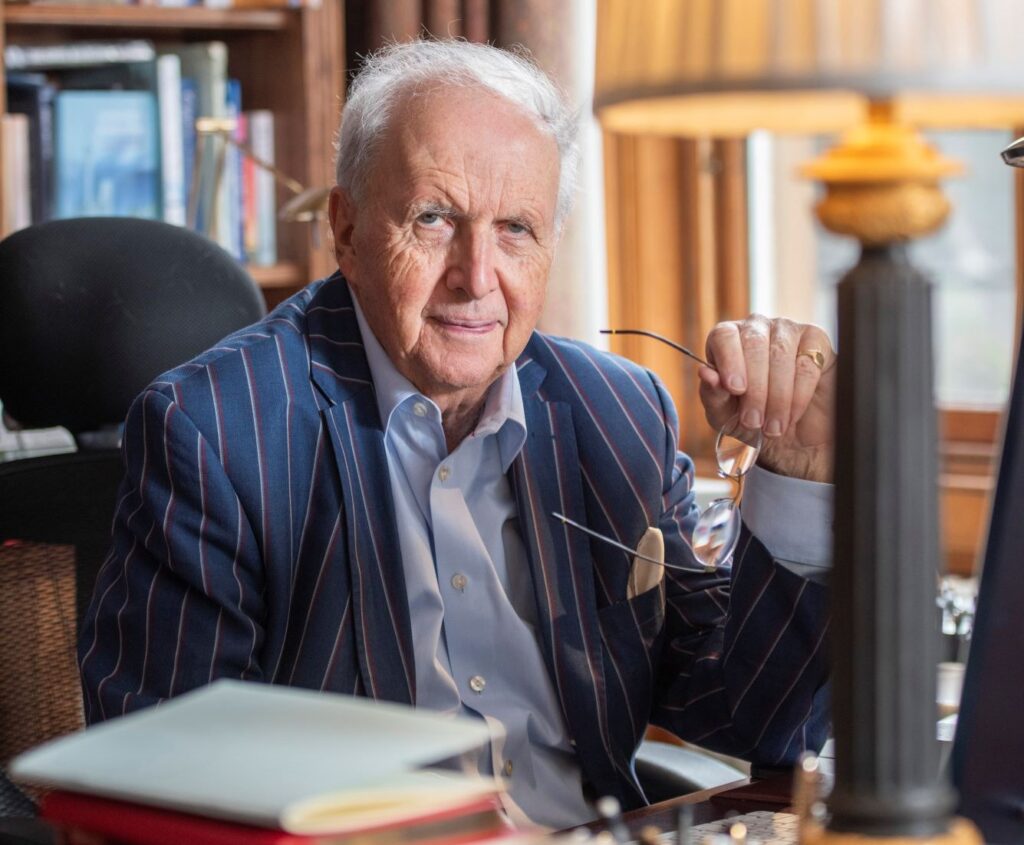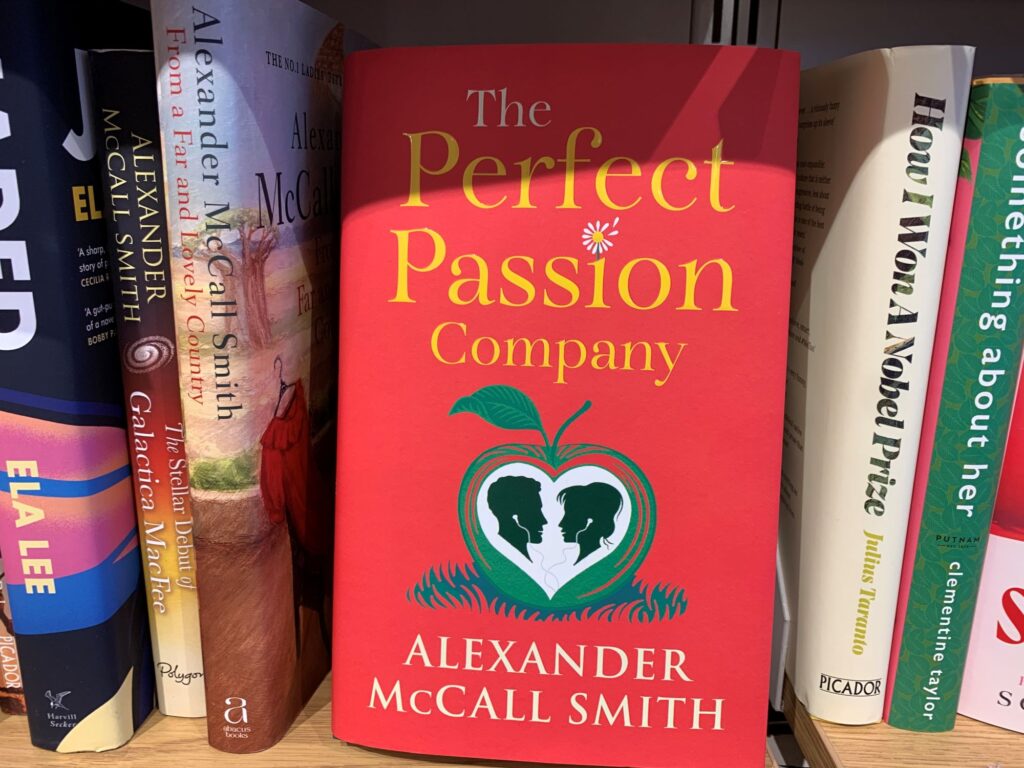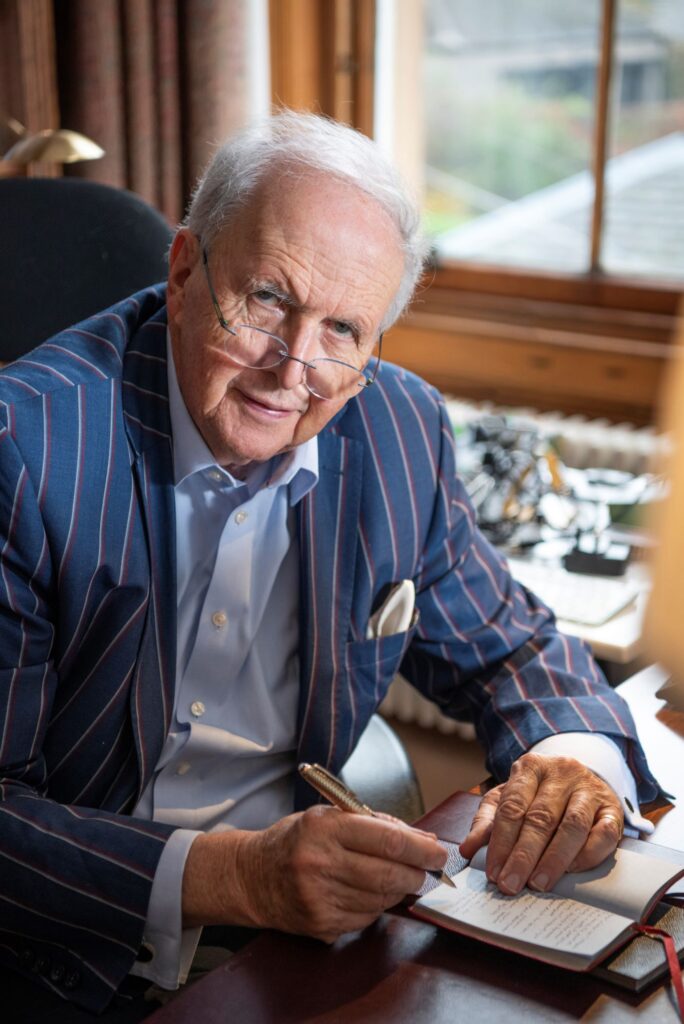
“It sounds a bit pretentious but I do lose track,” says the storytelling powerhouse that is Alexander McCall Smith, apologising for the latest benign tsunami of tales he is unleashing upon us.
Bit of an exaggeration, probably, but he does rather spoil his fans.
“I’ve got a new Ramotswe coming out, I’ve got a new Dalhousie coming out… so three coming out in the immediate future,” says the author who became a ‘Sir’ in the new year honours for services to literature, academia and charity.
The Great Hippopotamus Hotel, number 25 in the bestselling No. 1 Ladies’ Detective Agency series (featuring the all-seeing, all-knowing Precious Ramotswe) is due for a September release, preceded in June by The Conditions of Unconditional Love, number 15 in his Isabel Dalhousie series devoted to the fictional Edinburgh sleuth.
Sandwiched between them, with an August launch, is his latest standalone novel, The Winds from Further West, a love story set on the Isle of Mull.
- Read more: Banking on The Exchange
- Read more: Glass books a rare date with The Glasshouse
He thanks me for reminding him that it isn’t any of those he is due to be speaking about when he revisits the North East in May.
Up for discussion in Newcastle and Middlesbrough will be The Perfect Passion Company which takes us into the orbit of an Edinburgh dating agency run by Katie Donald who, while she doesn’t really know anything about running a dating agency, “tackles it in a good spirit”.
The water, tested with a pair of e-book shorts, proved conducive to the February launch of the full-blown novel, just in time for Valentine’s Day. A follow-up is due early next year, for this is to be yet another McCall Smith series.
Rather like a detective agency, explains Alexander (‘Sandy’ to friends), an introduction/marriage bureau is a neat device for assembling random characters and delving into their lives.
He agrees it might sound anachronistic in this world of online dating but says there are still people who prefer to do the business face-to-face.

“I think the problem with online dating is that people might not be using a recent photograph,” he reasons.
With a characteristic giggle, he adds: “I heard about one case where a chap put his so-called recent photograph online and it showed him in New York with the Twin Towers still standing.”
Of his most recent novel, with its blushing pink dust jacket, he says: “It’s romantic. It’s all about looking for happiness which is a major concern for most people.
“Most of us want to avoid loneliness and so seek somebody to help us through life. That’s really what it’s about. I had great fun writing it.”
Naturally, he read around the subject before the words started to flow and found a wealth of material.
“Psychologists and sociologists have looked very carefully at how people go about it and it’s very interesting.
A lot of people write their first manuscript and then rewrite it and jiggle around with it. I think you have to move on because the next one will be better.
Alexander McCall Smith
“There’s something called assortative matching where you effectively go for somebody you think, maybe even subconsciously, is going to satisfy certain criteria you have.
“For example, there are studies on the geography of matching, how far people live away from the person they eventually marry or shack up with. Most of us end up with somebody who lives within six miles of us.
“Also, we tend to go for people of similar background, similar educational attainment and roughly equal financial status. There’s a pattern you can see in this.
“Then people also tend to go for people who are, more or less, as attractive as they are. Subconsciously you might go, ‘OK, well I’m going to get somebody who looks OK but isn’t necessarily a crowd-stopper…’”
A question about Naked Attraction, the TV show in which physical attraction is all, elicits another giggle.
“Well, I have heard about it. I mean, that’s a shocking programme. That’s just ridiculous.”

More important, he reckons, are shared values.
“People tend to go for people they feel see the world in the same way in moral terms. The moral attributes are very important.”
Moral Attraction, I guess, wouldn’t have quite the same allure for viewers of Channel 4.
Alexander McCall Smith was an academic before becoming a writer of popular fiction. He taught law at the University of Botswana, the country where the Precious Ramotswe stories are set, and became professor of medical law at the University of Edinburgh. Now 75, he is emeritus professor in the university’s School of Law.
Law into fiction wasn’t such a strange jump, he says.
“Sir Walter Scott (author of Waverley, Ivanhoe and other classics) was a lawyer. The law is not incompatible with fiction. It’s about human affairs so is quite conducive to developing fictional narratives.
“If you look, for example, at some of the judgements of the late Lord Denning, they read like short stories. There’s a lot of raw experience in the law.”
Fiction, though, was something he took to like the proverbial duck to water. In fact, his output, with more than 100 books bearing his name, makes the duck look a bit of a slouch.
- Read more: My life through sketchbook: Sheila Graber
- Read more: Cultivating an award-winning career
Addressing his prolific output, he says: “I’m very fortunate, and I’m conscious of my good fortune, in that I do write quickly, so I write 1,000 words an hour.”
Hearing me gasp, he reassures me that journalistic fact-checking isn’t a hindrance he has to bother with.
“With fiction you can just plug into the subconscious and let it go, which is what happens with me. I go into a sort of state and it just comes out and I don’t really have to edit it, so that means I usually write two or three thousand words a day and sometimes more. As long as I can spend two or three hours writing, I can achieve that.”
Sometimes this can happen in the early hours, he says, deepening my sense of awe. “Last night I went to bed relatively early and woke up at half past one so I was writing from then until three.”
To aspiring writers, he advises persistence.

“Writing is like any activity, dependent on practice. Don’t wait for the muse to come and tap you on the shoulder because the muse is usually otherwise engaged. Just write and don’t give up.
“One thing I do say to people if they ask is don’t spend too much time on the first manuscript.
“A lot of people write their first manuscript and then rewrite it and jiggle around with it. I think you have to move on because the next one will be better.
“Writing is rather like playing the piano. In order to play the piano you have to develop brain pathways which enable you to put your fingers on the right keys. Writing, I think, is about developing pathways into the unconscious mind where fiction and language occur.”
Alexander — or Sandy or Sir Alexander — doesn’t play the piano but he does play the bassoon (though rarely now) in The Really Terrible Orchestra which he founded with his wife, Elizabeth, over 20 years ago.
“It’s been a great success,” he says.
“It’s not good. It’s for rank amateurs but it’s a great thing. People love it. Making music with other people where you’re under no pressure to be good is terrific.”

I point out the paradox here, that if you bought a ticket to see such an orchestra and it wasn’t bad, you might want a refund.
Sometimes, he elaborates, it can sound quite good and at other times terribly flat. “Sometimes you wince but it’s a lovely institution and if we’re talking about match-making, we’ve had two or three marriages as a result.
“It’s a very social thing, playing in a band. Music has a healing ability. It brings people together. It’s so sad to see music suffering in the education system. For kids it’s such good training for life.”
The orchestra is indicative of the fun side of Alexander McCall Smith which is what draws many to his writing.
He agrees that most of his books can be seen as “taking a fairly positive, optimistic view of life, which is not to deny that the world is a vale of tears, particularly at the moment.
“But it’s important not to throw in the towel and say this is grim and nothing can come to any good.”
A man who invented the ‘Scandi-blanc’ genre for his comic series featuring Swedish detective Ulf Varg, from the Department of Sensitive Crimes, says he never sets out consciously to cheer us up.
“I write things that I enjoy writing. It’s not that I sit here and say I’m going to write something upbeat. I think I end up writing in that register because, well, that’s just the register in which I write.”
Subconsciously you might go, ‘OK, well I’m going to get somebody who looks OK but isn’t necessarily a crowd-stopper…’
Alexander McCall Smith
And sometimes, as he admits, the public is liable to confront him with evidence that not everything bearing his name has been written to entertain.
The Criminal Law of Botswana, which he wrote years ago with a colleague, probably isn’t in print any more, he says.
“But oddly enough, every so often somebody comes along with one of my legal books.
“I did a book called Law and Medical Ethics which turns up from time to time and once I signed another very obscure book I wrote with a colleague called Forensic Aspects of Sleep.
“It was the only book at the time on the legal aspects of sleep disorders.”
Fiction has brought Alexander McCall Smith the sort of global acclaim (with his books available in 46 languages) which generates many moving fan letters and much travel.
He alludes to forthcoming promotional trips to America and Australia and says he wrote the last line of The Great Hippopotamus Hotel in an Okavango Delta safari lodge while watching hippos in a lake.
He won’t get that in the North East.
However, a devoted audience is on the cards when he appears at the Lit & Phil, Newcastle, on May 8 and at Middlesbrough Town Hall, in a taster for June’s Crossing the Tees Book Festival, on May 9.











